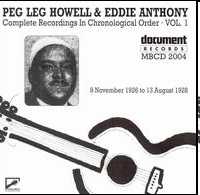
- Format: MP3

AMG Review of this CD by Steve Leggett
Atlanta street singer Peg Leg Howell wasn't really much of a guitarist, but his songs, many of which were made up of fragments of street vendor calls and other pre-blues material, have a sort of greasy and rough-hewed grace to them, and when combined with Eddie Anthony's careening fiddle runs, achieved a distinct sound (part string band, part hokum jug band) all too rare in early blues. His "Skin Game Blues" is a poignant and perfectly nuanced classic in the genre, while "Coal Man Blues" is an early statement and indictment of class distinction in the American South. This collection from Document Records gathers both of these songs, recorded in 1926, along with other worthy pieces, including "Tishamingo Blues" (which lends its title to an Elmore Leonard novel, Tishomingo Blues) and the revelatory "New Prison Blues." Filling things out here are pleasant pieces like the guitar-and-fiddle stomp "Hobo Blues," which shows how much Anthony brings to the table, and "Rock and Gravel Blues," which is made up of the usual floating verses of the day, but still manages a forward narrative push. Document has also issued a second volume of Howell's 78s, but this first installment is a little stronger in the song category. Howell and his friends have a particularly loose and interesting street sound, and curious listeners might do well to pick up both discs. The overall recorded sound is pretty decent, given the age and archival nature of the source 78s.
Biography by Jason Ankeny
One of the first recorded products of the Atlanta blues community of the pre-war era, Peg Leg Howell bridged the gap between the early country-blues sound and the 12-bar stylings to follow, with his guitar work evolving over time to include finger-picking and slide techniques. Born Joshua Barnes Howell in Eatonton, Georgia on March 5, 1888, he was a self-taught guitarist who acquired his nickname after a 1916 run-in with an irate brother-in-law which ended in a shotgun wound to the leg and, ultimately, amputation. Unable to continue working as a farmhand, he migrated to Atlanta, where he began pursuing music full-time; in addition to playing street corners for passing change, Howell supplemented his income by bootlegging liquor, an offense which led to a one-year prison sentence in 1925. Soon after his release, he signed to Columbia; his first session for the label yielded the menacing "New Prison Blues," a song he'd learned while serving time. Having amassed a huge repertory of songs over the years, Howell recorded prolifically over the following months, his work ranging from traditional ballads ("Skin Game Blues") to dance numbers (the minor hit "Beaver Slide Rag") to even jazz ("New Jelly Roll Blues"); while some of his sides comprised solo performances, others featured the backing of his street group, the Gang (guitarist Henry Williams and fiddler Eddie Anthony). Columbia pulled the plug in 1929, at which time Howell returned to playing Atlanta's famed Decatur Street district; Williams was himself imprisoned not long after, and following Anthony's 1934 death, Howell gradually disappeared from the area blues circuit. He spent the next several decades clouded in obscurity, with diabetes claiming his other leg in 1952. Howell was 75 when the Testament label sought him out in 1963 to record his first new material in over 40 years; he died in Atlanta on August 11, 1966.